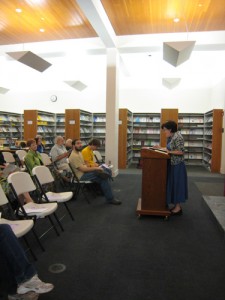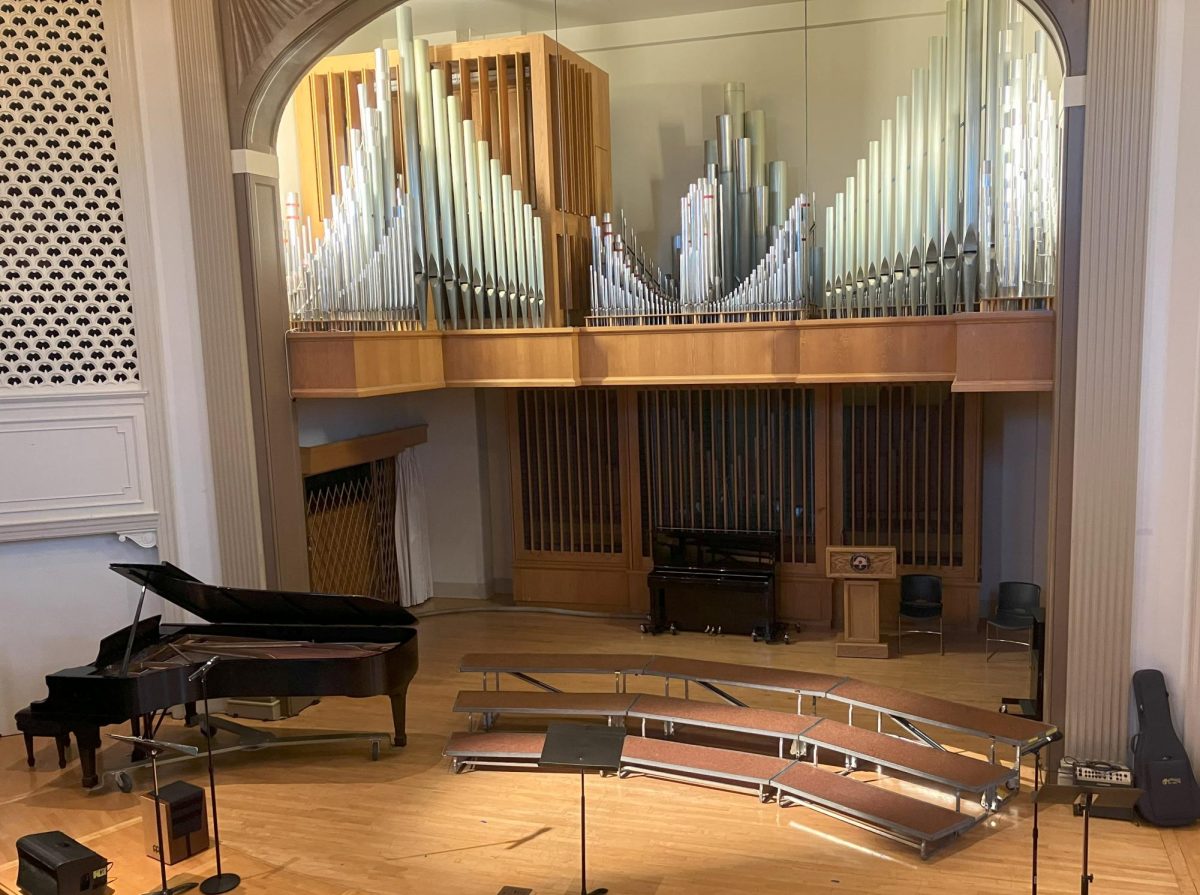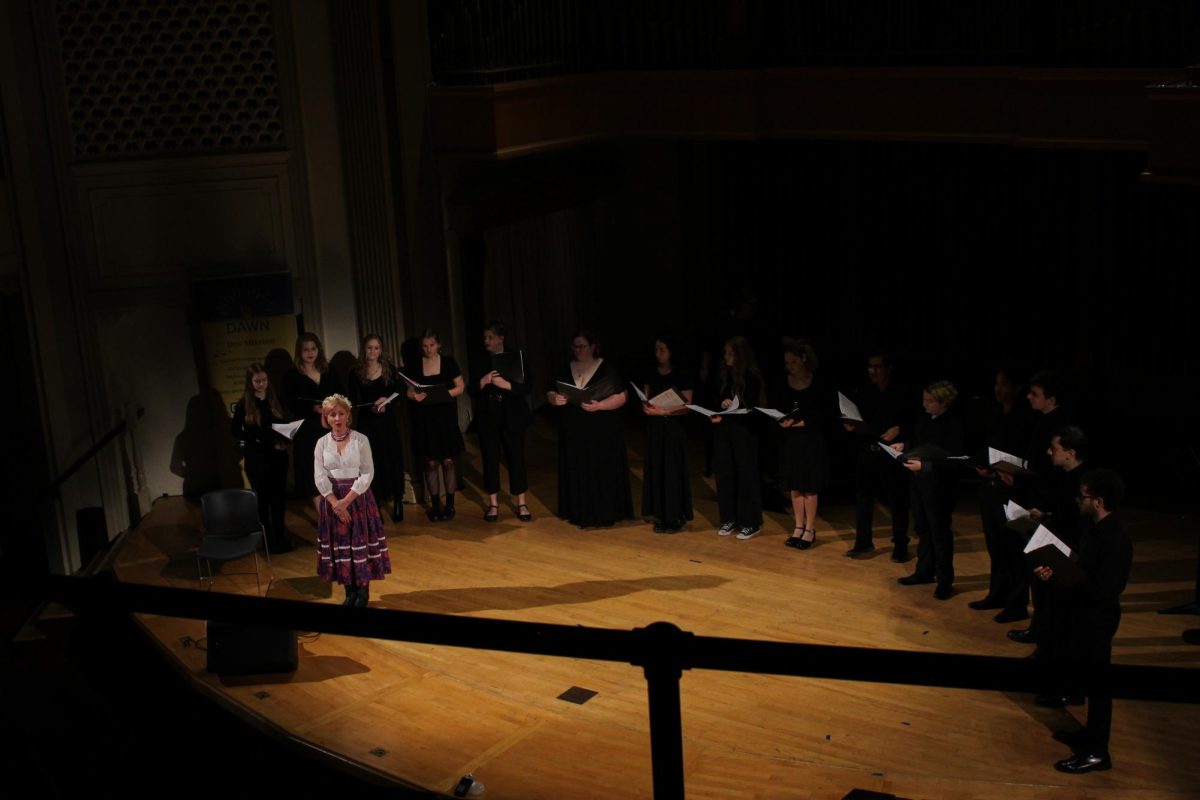Lizze Martinez
Senior reporter
Polish poetry may seem obscure to the average college student, but for translator Claire Cavanagh, it is as normal as Facebook. Having worked with two Nobel Prize-winning poets, she is a celebrity in the Polish literature community and passionate about language, life and culture.
During the week of Sept. 15, Cavanagh, Associate professor of Slavic languages and literature at Northwestern University, visited with six Linfield classes and spoke at the Nicholson Library, sharing her love of linguistics, literature and translation.
“She is so articulate and energetic,” senior Kate Kilcup said of Cavanagh. “It’s always fun to be around someone who is so passionate about her subject.”
In her speech Sept. 17, Cavanagh debunked the myth that Polish poetry is far removed from American culture. Her speech centered around the poem, “Try to Praise the Mutilated World,” by Polish poet Adam Zagajewski, which was printed on the back cover of the first issue of the New Yorker after Sept. 11, 2001, and which Cavanagh translated.
However, the poem never mentions Poland or America by name, nor does it include any cultural references. In fact, it was written before Sept. 11, 2001.
After the terrorist attack, Zagajewski’s poem spoke to Americans about enduring something horrible and how to find solace, something the Polish are well-acquainted with.
“For me, it’s the way I have always seen the world,” Zagajewski said in an interview with New Europe in 2002. “When I was growing up, I saw a lot of ruins in postwar Poland. Somehow it stayed with me, this feeling that the world is wounded or mutilated. The poem reflects a philosophical conviction more than an event.”
The history of Poland is one of war, oppression and subjugation. For much of the past century, Poland did not exist, having been appropriated by various countries such as Russia, Germany and Austria-Hungary.
“In Poland, poetry was a way of keeping the people and the language alive when [Poland] did not exist geopolitically,” Cavanagh said.
For the Polish, poetry has more significance than Americans can understand, she said. Because of this emphasis, her work as a translator is prized for sharing Polish poems with English readers.
Though translators are not well-known in the United States, Cavanagh has become something of a celebrity in Poland. She has appeared on talk shows and is well-known for her
literature.
“As Americans, we assume everyone speaks English, and everything will come to us eventually,” she said. “Poland knows [Polish] is not a language anyone has ever needed to know. They know their literature is only experienced because of translation.
Her translations helped Polish poet Wislawa Szymborska win the Nobel Prize for literature in 1996. The prizes are intended to facilitate global dialogue in the arts and sciences. Some members of the committee who chose the winners relied on the English translations of her poems, Cavanagh said.
At that time, Cavanagh and poet Stanislaw Baranczak just completed a translation of Szymborska’s poems, which was mentioned by the Nobel Prize Committee. As such, she was invited to the ceremony in Stockholm.
“I was terrified [that] I’d make my first mistake in Polish,” Cavanagh said. “And then the people would think, ‘This is the person who translated our most famous poet’s works?’”
For Cavanagh, translating is not a solitary endeavor. She works alongside poets to match cultural contexts, an especially difficult job in poetry because poets often play with language and idioms to make a point.
“All sorts of ordinary objects and things you absolutely take for granted seem not radically different, but pragmatically different,” Cavanagh said.
Cavanagh said colloquialisms are one of the hardest parts to translate because they are often illogical. She said some poems are simply impossible to translate.
“She’s too modest to say it, but she has to be a kind of poet herself to translate these poems,” Kilcup said. “The ideas are already there, but she has to kinda write the poem again.”
With a background in linguistics and both Russian and Polish language and literature, Cavanagh had the perfect background to begin translating creative works. Though she said she stumbled into the field through a series of flukes, she also said she loves what she does.
“[Linguistics] is like doing a really, incredibly hard crossword puzzle that you can’t finish.” Cavanagh said. “It’s figuring out how the language works and why it deviates. I love that language is in constant motion.”
In 2000, Cavanagh met the 1980 Nobel Prize for literature winner, Polish poet Czeslaw Milosz. For Milosz, poetry was a way to preserve the multiethnic, multilingual community that existed in Poland before World War II.
Through her work with Zagajewski, Szymborska and Milosz, Cavanagh has introduced a new set of readers to the wonders of
Polish poetry.







